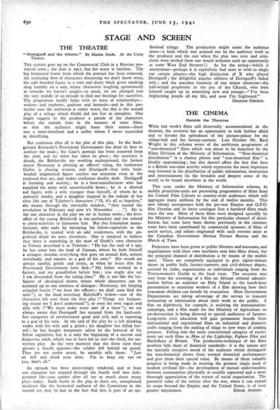STAGE AND SCREEN
THE THEATRE
Dostigaeff and the Others." By Maxim Gorki. At the Unity Theatre.
THE curtain goes up on the Commercial Club in a Russian pro- vincial town ; the date is 1917, but the scene is familiar. The big bedizened frame from which the portrait has been removed, the confusing flow of characters discussing we don't know what, the odd bearded figure in a torn and dusty black gown smoking shag humbly on a sofa, minor characters laughing uproariously at remarks we haven't caught—as usual, we are plunged into the very middle of an episode to find our bearings for ourselves. The programme hardly helps with its mass of relationships— widows and nephews, godsons and bastards—and in this par- ticular case the confusion is rather worse, for this is the second play of a trilogy which Gorki did not live to complete. One
might suggest to the producer a parade of the characters before the curtain rises in the manner of some films, so that the audience might learn their names—there was a meat-merchant and a miller whom I never succeeded in identifying.
But confusion after all is the plot of this play. In the back- ground Kerensky's Provisional Government has done its best to confuse the issue ; the Czar's portrait has been removed from the club, and no other has taken its place ; the secretary is drunk, the Bolsheviks are working underground, the former mayor Nestrasny is plotting an officers' rising, the landowner Gubin is chasing women, and Dostigaeff—that little bald- headed enigmatical figure catches our attention even in the confused first act, and makes confusion doubly dark. Dostigaeff is listening and waiting ; he is a boot-manufacturer who has supplied the army with unserviceable boots ; he is a shrewd sad figure, with a wife younger than himself, of whom he is jealously tender, and a daughter trapped in the tedium of her class like one of Tchehov's characters ("0, it's all so hopeless," she moans through the inevitable window, " they started the revolution in February and now it's November . . ."). He is the one character in the play we see in human terms ; the love- affair of the young Bolshevik is too perfunctory and too related to party-activities to humanise him. But this fraudulent manu- facturer, who ends by betraying his fellow-capitalists to the Bolsheviks, is treated with an odd tenderness, with the un- political detail we miss elsewhere. One is tempted to believe that there is something in the man of Gorki's own character as Tolstoy described it to Tchehov: "He has the soul of a spy, he has come into the land of Canaan, where he feels himself a stranger, watches everything that goes on around him, notices everybody, and reports to a god of his own." His words are always careful, gentle and ironic, as when he hears that the Provisional Government have fled—" My father worked in a factory, and my grandfather before him ; you might also say I am descended from the ruling class." He is not like the lay- figures of ideological drama whose whole characters can be summed up in one sentence of dialogue: Nestrasny, the limping crippled fascist (" we have the officers ; we shall soon find the men "), or the dead merchant Bulichoff's widow—one of the characters left over from the first play (" Things are happen- ing round me I don't understand "), or even his own vague and silly wife (" We must make some sort of a show "); we are always aware that Dostigaeff has escaped from the hard-and- fast categories of revolutionary good and evil, and is reporting to a god of his own. At the end of the play he is left drinking vodka with his wife and a priest ; his daughter has killed her- self ; he has bought temporary safety by the betrayal of his fellow capitalists, but it is only the beginning of a narrow and dangerous track, which was to have led us into the third, the un- written play. At the very moment that the three raise their glasses a fourth appears—the soldier left behind on guard. They are not under arrest, he amiably tells them: " Just sit still and drink your wine. I'm to keep my eye on you, that's all."
An episode has been interestingly rendered, and at least one character has stepped through the fourth wall into inde- pendent life—you cannot after all say as much about many plays today. Such faults in the play as there are, unexplained incidents like the hysterical outburst of the Commissar in the
second act, may be due to the fact that this is part of an un-
finished trilogy. The production might assist the audience more—a fault which was pointed out by the audience itself to the producer and the cast when the play was over and criti- cisms were invited (how one would welcome such an opportunity at some West End theatres!). As for the acting—which is anonymous—perhaps it is capitalistic bad taste to wish to single out certain players—the high distinction of X who played Dostigaeff ; the delightful angular silliness of Dostigaeff's faded wife ; and the macabre intensity of one minor character—the half-witted prophesier in the pay of the Church, who feels himself caught up in something new and strange—" I've been frightening people all my life, and now I'm frightened."
GRAHAM GREENE.


























 Previous page
Previous page